"I think it's important to give back—to lift as you climb."
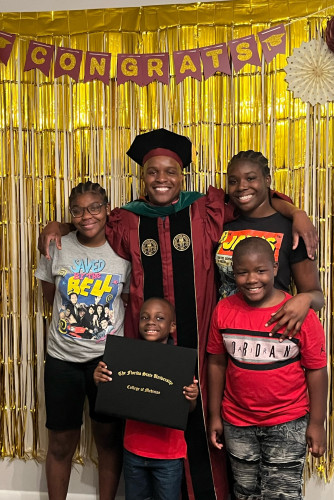
his graduation from medical school in 2022
Though time-management skills aren’t explicitly taught on most college campuses, the ability to juggle coursework, co-curricular activities, recreation, and (occasional) sleep generally emerges as students navigate the road to graduation. Dr. Cortez Brown, C’16, packed his years at Sewanee with a rigorous combination of pre-med classes, athletics, and community service—but he received practice in multitasking long before arriving at the University. Growing up in a single-parent family, primarily in the Vero Highlands region of Florida, Brown started a job at Walgreens as soon as he was old enough to work. Most weekdays involved rising before dawn to complete homework and exercise, then attending school, followed by football practice until dark. Saturdays were devoted to his 2 p.m.-10 p.m. work shift, and Sundays meant church and, often, an afternoon shift. “I was constantly busy,” Brown says, which seems like an understatement.
Brown’s workload has hardly lightened up in recent years. He’s now a resident in the Department of Orthopaedic Surgery at the University of Pittsburgh, and most days he’s at the hospital by 5 a.m. to check lab results before launching into a full slate of patient care, medical study, and research activities. He also oversees Octavian Village, a nonprofit he founded to promote educational equity in Florida’s Treasure Coast region and beyond. Somehow, he finds time to support Sewanee’s pre-med and multicultural programs through the Sewanee Fund. “I think it’s important to give back—to lift as you climb,” he says.
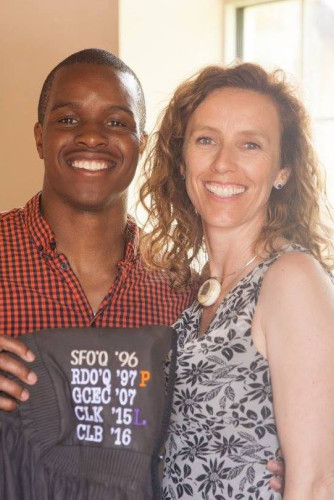
Sewanee first landed on Brown’s radar during his years at Saint Edward’s School in Vero Beach, Florida, which he attended from 10th through 12th grade. At the time, Saint Edward’s boasted two Sewanee alumni on its faculty: Louise Kennedy, L’15, is the former chair of the high school’s English Department, and Les Rogers, C’85, heads the boys’ weightlifting program. Brown says he felt compelled to apply to the University because Kennedy and Rogers thought it would be a good fit for him, but he worried about campus diversity. A trip to the Mountain during MLK Day weekend put him at ease. “I thoroughly enjoyed my time [on campus], and I met one of my best friends during my first visit—Amy Nelson Woodard, C’15.” Brown adds that he was excited by Sewanee’s atmosphere and by “being around the amazing people who were there.”
Compared to the whirlwind pace of his pre-Sewanee life, Brown says he experienced “more bandwidth” as an undergraduate. He explored majoring in Spanish but ultimately pivoted to biology. Outside the classroom, he participated in football and men’s track and field, served as an Arcadian and a proctor, and spent a year on the Honor Council. All of these activities, he says, helped prepare him for his medical career by sharpening his communication skills. “As a member of the Honor Council and a proctor, I had to talk to different types of people and make them comfortable. As an Arcadian, I had to talk to families about Sewanee history while walking backwards.” In his current role as a consulting resident, he says, one of his key tasks is building rapport with large numbers of patients in a short amount of time. Being at Sewanee “helped me realize that we are much more alike than we are different—and we can relate to someone if we have the desire to do so.”
During his junior year, Brown joined with Dr. Fridien Nana Tchoukoua, C’17, to found the Sewanee Multicultural Health Society (SMHS). Brown says that he and Tchoukoua initially hoped to form a Sewanee chapter of the Multicultural Association of Pre-Health Students (MAPS), a diversity-focused organization operated by the Student National Medical Association, but they couldn’t meet MAPS’s membership criteria. “We said, ‘OK, that’s fine. We’ll just create an organization with the same interests, but specific to Sewanee. We asked ourselves, ‘What are Sewanee’s strengths, and how can we add value to the University and to the community as a whole?’”
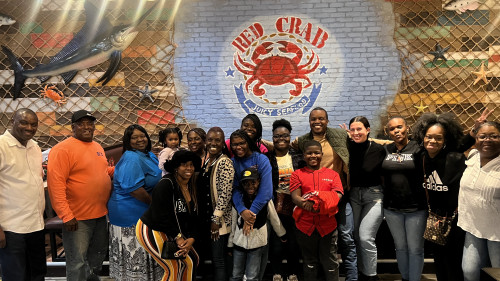
As a first step in determining how SMHS could support the Plateau region, Brown and Tchoukoua met with Ryan Cassell, then Sewanee’s director of admission, and his wife, Erin Hanni Cassell, C’98, former director of strategic digital infrastructure. Through Morton Memorial United Methodist Church in Monteagle, the Cassells regularly took part in bimonthly food drives benefiting more than 300 local residents. Brown says he and Tchoukoua learned from the Cassells that some community members “travel hours to get food and have to pick between paying for their heat in the winter and paying for food.” SMHS quickly began collaborating in food collection and distribution. Another SMHS priority, Brown says, was promoting “awareness of health issues that are impacting not only rural Appalachia, but also minorities in America.”
As he continued to explore the intersection of health and community outreach, Brown attended a campus lunch-and-learn presentation by Dr. Richard Hubbard, C’09, assistant professor of anesthesiology at Baylor College of Medicine and the Texas Children’s Hospital and founder of the Basic Needs Program, a nonprofit dedicated to providing healthcare for underprivileged patients with congenital heart disease. (Coincidentally, Hubbard completed his medical residency at the University of Pittsburgh, where Brown is now a resident.) Inspired by Hubbard’s work to improve cardiac care in Bangladesh, Brown resolved to design a program aimed at enriching and improving his Florida hometown. “I love education; I love athletics; and I love my community—so, I wanted to blend those things together,” he says. After reflecting on the education obstacles he faced during his childhood, Brown decided to concentrate on mitigating summer learning loss among underprivileged elementary school students.
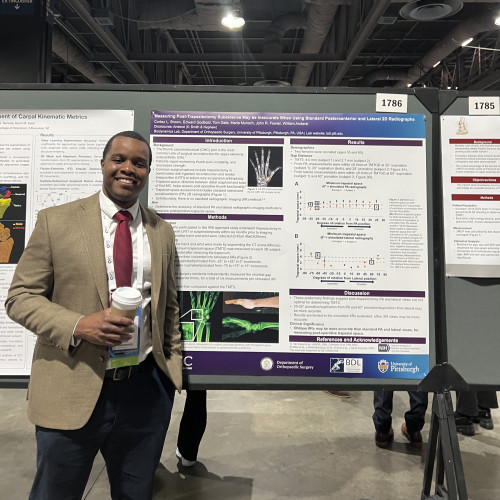
annual meeting in 2024
Brown reached out to Mike Mersky, former head of school at Saint Edward’s School, for advice and resources, and Mersky said Saint Edward’s could serve as a partner—but Brown would need to figure out program logistics. An online search for a Sewanee faculty mentor led Brown to Nicky Campbell, C’99, special assistant to the vice-chancellor for administration and community relations, who was then serving as director of community development for the Office of Civic Engagement and the South Cumberland Community Fund. “She taught me how to do a systematic literature review and how to develop an effective summer learning program,” Brown says. Equipped with this knowledge, Brown launched ProStudents at Saint Edward’s in June 2016.
Brown describes ProStudents as “a hybrid of academics and fun” designed for rising fifth and sixth graders from Title I schools. The program’s four-week curriculum mixed STEM activities with outings to Topgolf and other popular recreational spots. While the format was successful, Brown says he and ProStudents’ other leaders eventually felt limited by the program’s scope and duration. “We said, ‘Hey, this has been great, but we can only impact 25 kids at a time to make sure [the program] is reasonably financially sustainable. There are significantly more than 25 kids who may need this type of experience.’” Additionally, Brown says, he came to realize that underresourced students need a “year-round academic support structure.” Drawing from the insight he gained through his literature review, Brown transformed ProStudents into Octavian Village, a virtual tutoring program that will use technology to connect students with mentors in all parts of the country. He named the new nonprofit after his mother, Octavia.
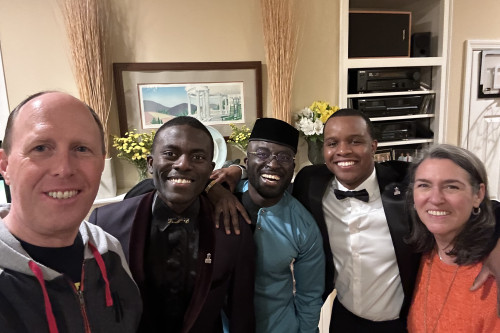
Between leading Octavian Village and developing his skills as an orthopedic surgeon, Brown says he isn’t able to visit the Mountain as often as he’d like—but he is part of the Benjamin Network, a University organization that empowers and celebrates Black alumni, and he recently attended the network’s third annual reunion. He notes that the late Eric Benjamin, C’73, Sewanee’s former director of multicultural affairs for whom the Benjamin Network is named, was one of the Sewanee Multicultural Health Society’s first donors. Brown describes Benjamin as “one of Sewanee’s greatest roots [who will] produce a lot of different flowers along the way for eternity.”
Whitney Franklin, executive director of the Sewanee Fund and advancement services, says Brown’s contributions to Sewanee show how philanthropy can take many forms. “It’s inspiring to meet alumni who have devoted significant time to enriching our community—either during their undergraduate years or after leaving the Mountain,” she says. “Time is valuable and can be a transformative investment, just like financial support.”
Spare time may be in short supply for Brown, but he says he isn’t bothered. “My mom worked her butt off to provide for me and my little sister—day in and day out, as one person doing the job of two. So, it’s hard for me to complain about my life right now and how busy I am. I can’t do it.” His strategy for getting tasks accomplished is simple: “There’s no right time to start something. You just have to put it in your schedule and do it.”

